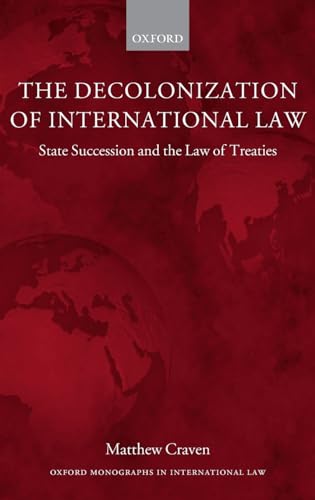Verwandte Artikel zu The Decolonization of International Law: State Succession...
The Decolonization of International Law: State Succession and the Law of Treaties (Oxford Monographs in International Law) - Hardcover

Inhaltsangabe
The issue of state succession continues to be a vital and complex focal point for public international lawyers, yet it has remained strangely resistant to effective articulation. The formative period in this respect was that of decolonization which marked for many the time when international law came of age and when the promises of the UN Charter would be realized in an international community of sovereign peoples. Throughout the 1990s a series of territorial adjustments placed succession once again at the centre of international legal practice, in new contexts that went beyond the traditional model of decolonization: the disintegration of the Soviet Union, Yugoslavia, and Czechoslovakia, and the unifications of Germany and Yemen brought to light the fundamentally unresolved character of issues within the law of succession.
Why have attempts to codify the practice of succession met with so little success? Why has succession remained so problematic a feature of international law? This book argues that the answers to these questions lie in the political backdrop of decolonization and self-determination, and that the tensions and ambiguities that run throughout the law of succession can only be understood by looking at the historical relationship between discourses on state succession, decolonization, and imperialism within the framework of international law.
Die Inhaltsangabe kann sich auf eine andere Ausgabe dieses Titels beziehen.
Über die Autorin bzw. den Autor
Matthew Craven is Professor of International Law, School of Oriental and African Studies, University of London
„Über diesen Titel“ kann sich auf eine andere Ausgabe dieses Titels beziehen.
EUR 8,22 für den Versand von Vereinigtes Königreich nach USA
Versandziele, Kosten & DauerNeu kaufen
Diesen Artikel anzeigenEUR 3,41 für den Versand innerhalb von/der USA
Versandziele, Kosten & DauerSuchergebnisse für The Decolonization of International Law: State Succession...
The Decolonization of International Law: State Succession and the Law of Treaties (Oxford Monographs in International Law)
Anbieter: WeBuyBooks, Rossendale, LANCS, Vereinigtes Königreich
Zustand: Very Good. Most items will be dispatched the same or the next working day. A copy that has been read, but is in excellent condition. Pages are intact and not marred by notes or highlighting. The spine remains undamaged. Bestandsnummer des Verkäufers rev7854630018
Anzahl: 1 verfügbar
The Decolonization of International Law: State Succession and the Law of Treaties (Oxford Monographs in International Law)
Anbieter: Lucky's Textbooks, Dallas, TX, USA
Zustand: New. Bestandsnummer des Verkäufers ABLIING23Feb2215580049127
Anzahl: Mehr als 20 verfügbar
Decolonization of International Law : State Succession and the Law of Treaties
Anbieter: GreatBookPrices, Columbia, MD, USA
Zustand: New. Bestandsnummer des Verkäufers 5185970-n
Anzahl: Mehr als 20 verfügbar
Decolonization of International Law : State Succession and the Law of Treaties
Anbieter: GreatBookPrices, Columbia, MD, USA
Zustand: As New. Unread book in perfect condition. Bestandsnummer des Verkäufers 5185970
Anzahl: Mehr als 20 verfügbar
The Decolonization of International Law (Hardcover)
Anbieter: Grand Eagle Retail, Bensenville, IL, USA
Hardcover. Zustand: new. Hardcover. The issue of state succession continues to be a vital and complex focal point for public international lawyers, yet it has remained strangely resistant to effective articulation. The formative period in this respect was that of decolonization which marked for many the time when international law came of age and when the promises of the UN Charter would be realized in an international community of sovereign peoples. Throughout the 1990s a series of territorialadjustments placed succession once again at the centre of international legal practice, in new contexts that went beyond the traditional model of decolonization: the disintegration of the Soviet Union,Yugoslavia, and Czechoslovakia, and the unifications of Germany and Yemen brought to light the fundamentally unresolved character of issues within the law of succession.Why have attempts to codify the practice of succession met with so little success? Why has succession remained so problematic a feature of international law? This book argues that the answers to these questions lie in the political backdrop of decolonization and self-determination, and that the tensions andambiguities that run throughout the law of succession can only be understood by looking at the historical relationship between discourses on state succession, decolonization, and imperialism withinthe framework of international law. Against the backdrop of decolonization and the territorial adjustments of the 1990s, the issue of state succession continues to be a vital and complex focal point for public international law. This book offers a pragmatic re-assessment of the foundations of the law of succession, assessing the attempts, and failures to achieve a codified body of law. Shipping may be from multiple locations in the US or from the UK, depending on stock availability. Bestandsnummer des Verkäufers 9780199217625
Anzahl: 1 verfügbar
The Decolonization of International Law
Print-on-DemandAnbieter: PBShop.store UK, Fairford, GLOS, Vereinigtes Königreich
HRD. Zustand: New. New Book. Delivered from our UK warehouse in 4 to 14 business days. THIS BOOK IS PRINTED ON DEMAND. Established seller since 2000. Bestandsnummer des Verkäufers L1-9780199217625
Anzahl: Mehr als 20 verfügbar
The Decolonization of International Law
Print-on-DemandAnbieter: PBShop.store US, Wood Dale, IL, USA
HRD. Zustand: New. New Book. Shipped from UK. THIS BOOK IS PRINTED ON DEMAND. Established seller since 2000. Bestandsnummer des Verkäufers L1-9780199217625
Anzahl: Mehr als 20 verfügbar
Decolonization of International Law : State Succession and the Law of Treaties
Anbieter: GreatBookPricesUK, Woodford Green, Vereinigtes Königreich
Zustand: New. Bestandsnummer des Verkäufers 5185970-n
Anzahl: Mehr als 20 verfügbar
The Decolonization of International Law: State Succession and the Law of Treaties (Oxford Monographs in International Law)
Anbieter: Ria Christie Collections, Uxbridge, Vereinigtes Königreich
Zustand: New. In. Bestandsnummer des Verkäufers ria9780199217625_new
Anzahl: Mehr als 20 verfügbar
The Decolonization of International Law: State Succession and the Law of Treaties
Anbieter: THE SAINT BOOKSTORE, Southport, Vereinigtes Königreich
Hardback. Zustand: New. New copy - Usually dispatched within 4 working days. 626. Bestandsnummer des Verkäufers B9780199217625
Anzahl: 15 verfügbar

